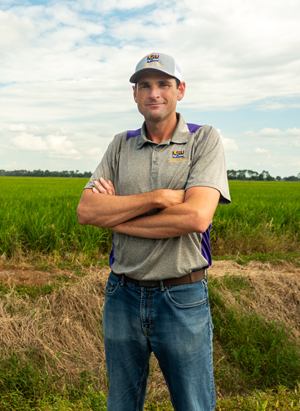Winning for Farmers
LSU’s Rice Research Leads the Way in Louisiana, for the World
 At the heart of LSU’s AgCenter is a mission of impact – one that stretches across
the fertile fields of Louisiana and influences the world stage. A key figure in that
mission is Adam Famoso, the LSU AgCenter H. Rouse Caffey Endowed Professor of Biological
and Agricultural Engineering and a dedicated researcher in LSU’s renowned rice breeding
program.
At the heart of LSU’s AgCenter is a mission of impact – one that stretches across
the fertile fields of Louisiana and influences the world stage. A key figure in that
mission is Adam Famoso, the LSU AgCenter H. Rouse Caffey Endowed Professor of Biological
and Agricultural Engineering and a dedicated researcher in LSU’s renowned rice breeding
program.
Hailing from central New Jersey, Famoso’s journey to the deep South was a winding one, but his passion for agriculture and innovation has firmly taken root in the Louisiana soil.
“When I first moved here, it wasn’t completely foreign. My sister had lived in Baton Rouge, and I’d visited several times,” he said, recounting the shift from his work in New York’s Adirondacks to leading rice research at LSU. It was a natural progression for a man who thrives on blending academic insight with tangible real-world results. “The opportunity here at the AgCenter was one I couldn’t pass up. It’s the best of both worlds. You’re able to focus on research that directly impacts farmers and the local economy while training students who go on to lead in the field.”
Since 1908, LSU’s research station has released more than 60 rice varieties, with recent years accelerating the pace to one or two new varieties annually. These varieties are not only vital for the livelihoods of Louisiana farmers but also have an international footprint. “If you’re buying rice at a local Louisiana supermarket, it’s likely an LSU-released variety,” he shared. And while these varieties address farmers' needs for better disease resistance, higher yield potential, and sustainability, they also benefit consumers, with innovations like high-protein rice and low glycemic varieties that support healthier diets.
For Famoso, this work is deeply rewarding, but it’s not just about scientific breakthroughs. “What excites me most is training the next generation of plant breeders,” he said. “Our students get to work in a real-world environment, preparing them to hit the ground running when they graduate. It’s not just academic knowledge; it’s practical skills that directly translate to industry needs.”
With agriculture forming the backbone of many rural economies in Louisiana, LSU’s research offers critical support for both large-scale and small farms. This success is not achieved through research alone. Philanthropic support plays a pivotal role in allowing LSU to remain competitive and innovative. “Donor support gives us flexibility that traditional government funding might not allow,” he explained. “It enables us to explore specific challenges in Louisiana’s agricultural landscape and ask the questions that matter most locally.”
His team’s commitment to collaboration and excellence has earned LSU a place as a global leader in rice research. Over 75% of the scientists who lead major international rice programs have passed through LSU, according to Famoso – a testament to the university's enduring impact on the field.
With philanthropic support and a strong commitment to research, he believes LSU is poised to continue building teams that win by combining their expertise with a shared vision of excellence. He shared, “We want to be the go-to institution for addressing challenges in rice production, not just in the U.S. but around the world.”
